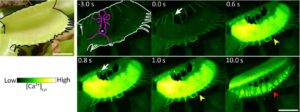
Coronavirus virus outbreak and coronaviruses influenza background as dangerous flu strain cases as a pandemic medical health risk concept with disease cells as a 3D render
Researchers have made significant strides in developing a universal antiviral treatment that could serve as a protective measure against future pandemics. By isolating a rare immune mutation known as ISG15 immunodeficiency, scientists have discovered a potential method to enhance the immune response against various viruses. This mutation, found in only a few dozen individuals worldwide, provides immunity to known viruses while making those affected more susceptible to certain bacterial infections.
The research team, led by Vagelos Bogunovic, believes that the mild, chronic inflammation experienced by individuals with this condition plays a crucial role in their enhanced immune response. The team has identified a way to stimulate the production of ten beneficial proteins from the sixty associated with this natural mutation. They achieved this by using ten specific mRNA sequences encapsulated within lipid nanoparticles, a delivery system that facilitates effective cellular uptake.
Potential Applications for First Responders
The implications of this treatment are particularly promising for first responders who are often at the frontline during health crises. According to Bogunovic, “we have yet to find a virus that can break through the therapy’s defenses.” This statement highlights the treatment’s potential effectiveness against not only known viruses but also unknown pathogens that could emerge in the future. Researchers envision this therapy functioning as a form of biological personal protective equipment (PPE), providing immediate immune support before specific vaccines can be developed.
The initial trials involved administering the treatment to hamsters and mice via nasal drip. Looking ahead, researchers are considering the feasibility of intranasal vaccines for human trials, which could enhance the accessibility and ease of administration for potential patients.
Future Directions and Considerations
While the findings are still in the experimental stages, the research offers a glimmer of hope for pandemic preparedness. The ability to protect against a wide array of viruses could revolutionize how society responds to emerging health threats. As the world continues to grapple with the effects of recent pandemics, such advancements in antiviral therapies could play a pivotal role in safeguarding public health.
In addition to this groundbreaking research, there is ongoing exploration into how technology, such as smartwatches, could assist in monitoring and managing outbreaks in real-time. The integration of health technology with innovative medical treatments may provide comprehensive strategies to mitigate the impact of future pandemics.
As scientists continue to explore the potential of this antiviral treatment, the focus will remain on ensuring safety and efficacy through rigorous testing. The journey from laboratory research to practical application will be critical in determining the long-term success of this promising approach.






